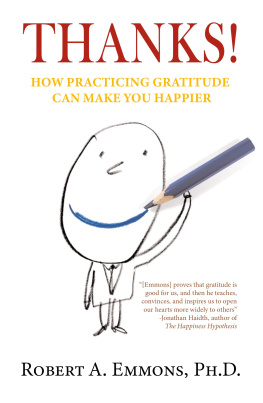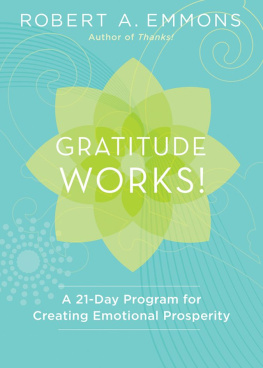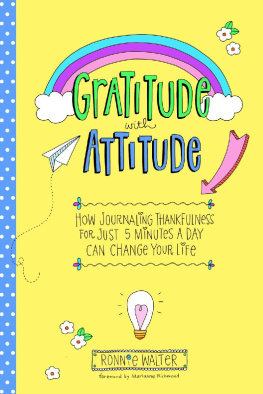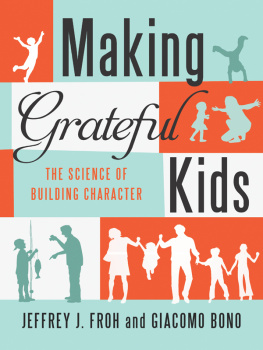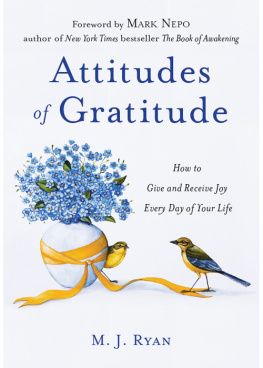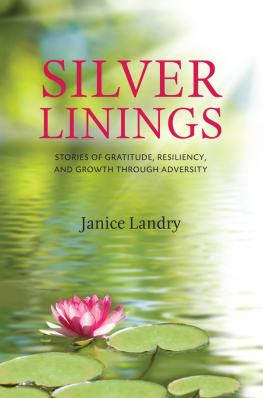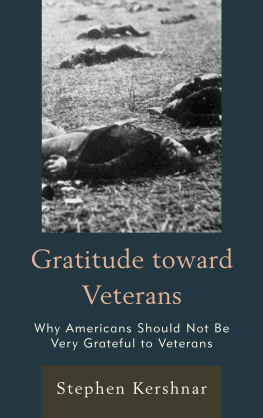| Thanks!: How Practicing Gratitude Can Make You Happier |
| Robert A. Emmons |
| Vibhatsu (Nov 2008) |
|
| Rating: |
| Tags: | Psychology, Applied, Self-Help, Personal, Growth, Happiness, Motivational, Inspirational |
| Psychologyttt Appliedttt Self-Helpttt Personalttt Growthttt Happinessttt Motivationalttt Inspirationalttt |
A scientifically groundbreaking, eloquent look at how we benefitpsychologically, physically, and interpersonallywhen we practice gratitude.
Did you know that there is a crucial component of happiness that is often overlooked?
Robert Emmonseditor-in-chief of the Journal of Positive Psychologyexamines what it means to think and feel gratefully in Thanks! and invites readers to learn how to put this powerful emotion into practice.
Scientifically speaking, regular grateful thinking can increase happiness by as much as 25 percent, while keeping a gratitude journal for as little as three weeks results in better sleep and more energy. But theres more than science to embrace here: Emmons also bolsters the case for gratitude by weaving in writings of philosophers, novelists, and theologians that illustrate all the benefits grateful living brings.
In Thanks!, Emmons shows how wanting what we have can measurably change peoples lives for the better.
About the Author
Robert A. Emmons is a professor at the University of California, Davis, and one of the leading scholars in the positive psychology movement.
He is also editor-in-chief of the Journal of Positive Psychology. His work on gratitude has been featured in the Washington Post, the New Republic, Newsweek, and other mainstream media. Dr. Emmons has received multiple grants from the National Institute of Mental Health and the John Templeton Foundation.
Books by Robert A. Emmons
Robert A. Emmons, Ph.D.
Copyright
Copyright 2007 by Robert A. Emmons
All rights reserved
For information about permission to reproduce selections from this book, write to Permissions, Houghton Mifflin Company, 215 Park Avenue South, New York, New York 10003.
Visit our Web site: www.houghtonmifflinbooks.com.
Library of Congress Cataloging-in-Publication Data
Emmons, Robert A.
Thanks!: How Practicing Gratitude Can Make You Happier
p. cm.
Includes bibliographical references and index.
ISBN-13: 978-0-618-62019-7
ISBN-10: 0-618-62019-2
1. Gratitude. 1. Title.
BF575.G68E46 2007
179 -9 dc22 2006030297
ePub created and Published by Vibhatsu, 2022
Cover re-design by Cadzbudy, 2022
Printed in the United States of America
mp 10 987654321
credits Figure 2.1 on page 23: Source: Lyubomirsky, Sheldon, & Schkade (2005). Reprinted by permission. Figure 3.1 on page 72: Copyright 2001 Institute of HeartMath. Reprinted by permission. Cartoon on page 100: Reprinted by permission from http://www . CartoonStock.com. Blessed Be the Name of the Lord on page 117: Copyright 2002 Matt Redman. Reprinted with permission.
Acknowledgments
Its been said that the only certainties in life are death and taxes. Closely following in third place is the certainty of debt. As humans, we are in debt. Not financial debt, though that is reality for many of us as well, but an emotional and personal debt to all those who have helped us on our journeys. From cradle to grave, we are in debt to the countless individuals who make us what we are and on whom we depend. Debts of gratitude are different from other kinds of debts, however, in that they are pleasant. This form of gratitude is a glad indebtedness. I am gladly indebted to a large number of persons who have helped make this book possible.
Mike McCullough was my collaborator on the gratitude research project, and I owe him a special thanks. Mike has been a good friend and co-conspirator on various projects over the years, and without his expertise and encouragement little of the research in this book could have been conducted. A number of other students, colleagues, and mentors have made important contributions to the science of gratitude, including Barbara Fredrickson, Bob Roberts, Brother David Steindl-Rast, Charles Shelton, Chris Peterson, Dacher Keltner, Dan McAdams, David Myers, Jeffrey Froh, Jo-Ann Tsang, Jon Haidt, Marty Seligman, Patrick McNamara, Peter Stewart, Philip Watkins, Ray Paloutzian, Sol Schimmel, Ste-fanie Gray-Greiner, Stephen Post, and Todd Kashdan. Discussions, collaborations, and friendships with these individuals have deepened my understanding of the vital role that gratitude plays in human affairs.
Locally, I am indebted to Ted Abresch and Craig McDonald at the University of California-Davis Medical Center for allowing me to participate in their research and training grant on the quality of life in persons with neuromuscular disease. I thank all those who participated in this research and were generous with their time and self-disclosure. Lisa vi Acknowledgments
Krause was invaluable in managing this aspect of the project. Over the past several years, 1 have benefited from the support of my department chair, Phil Shaver, and Deans Steven Sheffrin and Steven Roth in the College of Letters and Science. 1 thank Gabriel Unda of Campus Media works for his photographic skills. Special thanks goes to Sarah Schnitker for keeping my lab alive and running while I took a sabbatical leave to complete this book.
Esmond Harmsworth, from the Zachary Shuster Harmsworth Literary Agency, was everything a novice writer could ask for in an agent, and much more. I am so grateful for his insight, wit, wisdom, and encouragement throughout this process. The book is so much better because of his attentiveness and support, and I am indebted to him. Thanks also go to Jane Rosenman, my editor at Houghton Mifflin, for her twin passions of clear, concise writing and the New York Yankees, over both of which we had many discussions and shared e-mails. I thank Beth Burleigh Fuller, manuscript editor at Houghton Mifflin, for her conscientiousness in guiding the manuscript through production. Ive become convinced that copy editors are really the unsung heroes in the publishing business.
Much of the research reported in this book was supported through generous grants from the John Templeton Foundation. I am especially indebted to Executive Vice President Arthur Schwartz for his unflagging support and enthusiasm and his desire to translate basic research into forms that will have the greatest impact in society. I am also grateful for the support of Senior Vice-President Chuck Harper, President Jack Templeton, Senior Fellow Mary Ann Meyers, Joanna Hill, editor of the Templeton Foundation Press, and Sir John Templeton. 111 never forget the moment when Sir John stood up at a gratitude conference and posed the question to the audience, How can we get six billion people around the world to practice thanksgiving? May this book be a modest beginning toward this goal.
My wife, Yvonne, and our two boys, Adam and Garrett, have provided me with countless opportunities for gratitude. As the main sources of thanksgiving in my life, this book is dedicated to them.
Contents

